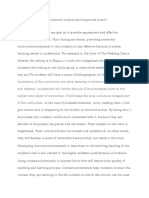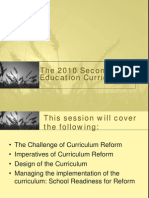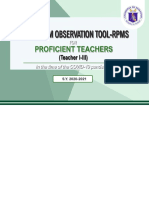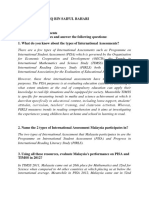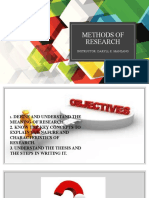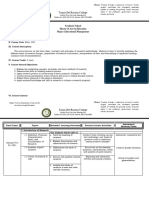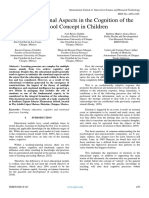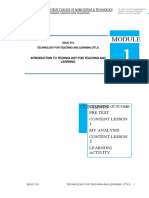Philosophies in Teaching
Philosophies in Teaching
Uploaded by
Arielle Ariane NacarCopyright:
Available Formats
Philosophies in Teaching
Philosophies in Teaching
Uploaded by
Arielle Ariane NacarOriginal Description:
Copyright
Available Formats
Share this document
Did you find this document useful?
Is this content inappropriate?
Copyright:
Available Formats
Philosophies in Teaching
Philosophies in Teaching
Uploaded by
Arielle Ariane NacarCopyright:
Available Formats
NAME: ARIELLE ARIANE J.
NACAR YEAR AND SECTION: DPE BATCH SEPTEMBER 2019 SUBJECT: FOUNDATIONS OF EDUCATION 2
THE SEVEN PHILOSOPHIES AS USED IN EDUCATION
PHILOSOPHY WHAT IS? WHY TEACH? HOW?
Educational Essentialism is a philosophy, which states that To instill students with the ‘essentials’ of academic knowledge, Teacher – centered approach in which the
children should learn the traditional basic subjects and that patriotism, and character development through traditional (or back-to- teacher’s role is to impart a respect for authority,
ESSENTIALISM these should be learned thoroughly and rigorously. basic) approach. determination, a strong work ethic, compassion
To promote reasoning, train the mind, and ensure common culture for for others, and sensibility.
all citizens.
An educational movement, which states that students learn To give emphasis that student should test ideas by active Students learn through action and being involved
through their own experiences. It revolves around the experimentation. in the process that will get to the product.
PROGRESSIVISM students’ needs, including teaching students to be good To inculcate learning that is rooted in the questions of the learners that
citizens as well as good learners. arise through experiencing the world.
An educational philosophy that focuses on everlasting ideas To prepare students for life by developing their intellectual and moral Teacher – centered approach. Perennial
and universal truths. The focus of education should be the qualities through emphasizing knowledge and the meaning of educators are primarily concerned with the
PERENIALISM ideas that lasted for centuries and believes that the ideas knowledge, servings to enhance student’s critical thinking skills in their importance of mastery of the content and
are as relevant and meaningful today as when they were search for individual freedoms, human rights and responsibilities development of the reasoning skills.
written. through nature.
An approach to education and learning that focuses on the To develop a sense of commitment to free choice. Focus is on the individual. Existentialists focus on
individual’s freedom to choose their own purpose in life. To prepare a child for social adjustment, such that it makes the child the actions of historical individuals, who provide
EXISTENTIALISM able to see beyond personal interest and goal. possible models for the students’ own behavior,
rather that emphasizing historical events.
Focuses on objectively observable behaviors and discounts To emphasize the role of environmental factors in influencing Reward and punishment based system. Teachers
any independent activities of the mind. Defines learning as behavior, to the near exclusion of innate or inherited factors. provide positive reinforcement whenever students
BEHAVIORISM nothing more than the acquisition of new behavior based on perform a desired behavior.
environmental conditions.
Is the view that philosophical problems could be solved (or To develop new skills and acquire new kinds of knowledge which also Teach language and communication through
LINGUISTIC dissolved) either by reforming language or by understanding underpin and strengthen their understanding of linguistics in general. experiential way
PHILOSOPHY more about the language that we presently use.
is a philosophy of learning founded on the premise that, by To develop intrinsically motivated and independent learners Teacher provides students with data or
reflecting on our experiences, we construct our own adequately equipped with learning skills for them to be able to experiences that allow them to hypothesize,
CONSTRUCTIVISM understanding of the world we live in. construct knowledge and make meaning of them. predict, manipulate objects, pose questions,
research, investigate, imagine and invent.
You might also like
- Ruby 7Es-lesson-plan-demo-applied-econ-CO2Document6 pagesRuby 7Es-lesson-plan-demo-applied-econ-CO2ruby jane taunanNo ratings yet
- Gen Physics 1 - Final ExamDocument2 pagesGen Physics 1 - Final ExamArielle Ariane Nacar100% (4)
- Philosophical Theories of Learning and Teaching ScienceDocument2 pagesPhilosophical Theories of Learning and Teaching ScienceDANA ISABELLE PILAPILNo ratings yet
- Module 2.1Document20 pagesModule 2.1Maila Calimpong AsimNo ratings yet
- Course Syllabus in Philosophical Educ 2Document3 pagesCourse Syllabus in Philosophical Educ 2Armilyn Macasero Lubuguin100% (1)
- Merrill's First Principles of Instruction: Group 5Document10 pagesMerrill's First Principles of Instruction: Group 5Ma Cecilia TransfiguracionNo ratings yet
- SEAMEO INNOTECH Best Practices - 2018Document33 pagesSEAMEO INNOTECH Best Practices - 2018Pau TorrefielNo ratings yet
- Action Research in EducationDocument1 pageAction Research in EducationAiman UsmanNo ratings yet
- Module 2Document7 pagesModule 2Aiza Adiarte SaguidNo ratings yet
- DEPED FORM 138 JhsDocument2 pagesDEPED FORM 138 JhsJustine Kaye Miape IntingNo ratings yet
- ACTION RESEARCH Final Na UntaDocument9 pagesACTION RESEARCH Final Na UntaWilliam VincentNo ratings yet
- Inquiry Based Learning & Localization & ContextualizationDocument55 pagesInquiry Based Learning & Localization & ContextualizationDhan Bunsoy71% (7)
- Contextualization AP10Document70 pagesContextualization AP10Ha Zy ACNo ratings yet
- I.Objectives: School Grade Level Teacher Learning Area QuarterDocument8 pagesI.Objectives: School Grade Level Teacher Learning Area QuarterAden Zaira Bribon CancinoNo ratings yet
- Contextualize, Localized, IndiginizedDocument2 pagesContextualize, Localized, IndiginizedGinalyn DoromalNo ratings yet
- Education System of The PhilippinesDocument41 pagesEducation System of The PhilippinesBeatriz Requena ÁlvarezNo ratings yet
- My 21st Century Classroom Facilitating SkillsDocument2 pagesMy 21st Century Classroom Facilitating SkillsNitaflor GanioNo ratings yet
- The 2010 Secondary Education CurriculumDocument35 pagesThe 2010 Secondary Education CurriculumMarvin ValienteNo ratings yet
- TEMPLATE List of Instructional Materials...Document5 pagesTEMPLATE List of Instructional Materials...Jayson Dotimas VelascoNo ratings yet
- College of Education: Class Schedule DaytimeroomDocument11 pagesCollege of Education: Class Schedule DaytimeroomPanget pangetNo ratings yet
- SCIENCE 5es LESSON PLANDocument2 pagesSCIENCE 5es LESSON PLANALoma Jane100% (2)
- Our Story - History of Don Jose M. Ynares Sr. Memorial National High SchoolDocument4 pagesOur Story - History of Don Jose M. Ynares Sr. Memorial National High SchoolJay-L TanNo ratings yet
- Regional Curriculum MatrixDocument11 pagesRegional Curriculum MatrixAngelo Villanueva100% (4)
- Classroom Observation Tool-Rpms: Proficient TeachersDocument8 pagesClassroom Observation Tool-Rpms: Proficient TeachersJosefina LlamadoNo ratings yet
- Pisa & Timms QuestionsDocument2 pagesPisa & Timms QuestionsHaziqBahariNo ratings yet
- Methods of ResearchDocument39 pagesMethods of ResearchDaryll E. ManzanoNo ratings yet
- CS Form No 212 Work Experience SheetDocument1 pageCS Form No 212 Work Experience SheetMa. Martina Delos SantosNo ratings yet
- Syllabus On Educ 200 Methodology of ResearchDocument11 pagesSyllabus On Educ 200 Methodology of ResearchVanessa L. VinluanNo ratings yet
- Philosophy of Teaching 1Document1 pagePhilosophy of Teaching 1Pauline Adriane BejaNo ratings yet
- Annex C - Minutes of The MeetingDocument2 pagesAnnex C - Minutes of The MeetingLeu Gim Habana PanuganNo ratings yet
- StrategiesDocument22 pagesStrategiesJericho D. LleraNo ratings yet
- DO 55, SDocument2 pagesDO 55, SUriVermundoNo ratings yet
- K To 12 CurriculumDocument8 pagesK To 12 CurriculumEnzo CruzNo ratings yet
- Integrative AssessmentDocument1 pageIntegrative AssessmentErline BenitezNo ratings yet
- Group 5Document16 pagesGroup 5John DexterNo ratings yet
- HAZEL LEIN GRANIL-Advanced-Theories-and-Practices-on-School-Supervision-FINAL-EXAMDocument7 pagesHAZEL LEIN GRANIL-Advanced-Theories-and-Practices-on-School-Supervision-FINAL-EXAMHazel L IbarraNo ratings yet
- Adjustment and Challenges of Technology and Livelihood Education Teachers in K To 12 CurriculumDocument5 pagesAdjustment and Challenges of Technology and Livelihood Education Teachers in K To 12 CurriculumInternational Journal of Innovative Science and Research TechnologyNo ratings yet
- 11 SHS Curriculum and Program Requirements 101414Document75 pages11 SHS Curriculum and Program Requirements 101414bernardNo ratings yet
- Psychoemotional Aspects in The Cognition of The School Concept in ChildrenDocument3 pagesPsychoemotional Aspects in The Cognition of The School Concept in ChildrenInternational Journal of Innovative Science and Research TechnologyNo ratings yet
- Module 7 Curriculum Development PDFDocument9 pagesModule 7 Curriculum Development PDFManuel CruzNo ratings yet
- Multiple Choice Test Construction FinalDocument44 pagesMultiple Choice Test Construction FinalQuinie AsperinNo ratings yet
- Maed Curriculum EnhancementDocument9 pagesMaed Curriculum Enhancementapi-292024713No ratings yet
- The Utilization of Educational Technology in Enhancing Mathematics Learning in K:12 Classrooms in Batangas National High School: Guide in Developing Student Enhancement ActivitiesDocument49 pagesThe Utilization of Educational Technology in Enhancing Mathematics Learning in K:12 Classrooms in Batangas National High School: Guide in Developing Student Enhancement ActivitiesLykee Bee100% (1)
- TTL 1 Module 1Document9 pagesTTL 1 Module 1Bryan Jay Cordero RayosNo ratings yet
- CHM 423 - Polymer Technology Module PDFDocument3 pagesCHM 423 - Polymer Technology Module PDFGlory UsoroNo ratings yet
- ED SCI 401 Fluid Mechanics SyllabusDocument14 pagesED SCI 401 Fluid Mechanics SyllabusRaeh YooNo ratings yet
- Integration of Gamification in Teaching Measures of Position of Grade 10 - MathematicsDocument10 pagesIntegration of Gamification in Teaching Measures of Position of Grade 10 - MathematicsIOER International Multidisciplinary Research Journal ( IIMRJ)No ratings yet
- TL Glaiza Alair - Sultan KudaratDocument64 pagesTL Glaiza Alair - Sultan Kudaratleon08jayNo ratings yet
- 2nd Semester 2018 2019Document11 pages2nd Semester 2018 2019Anonymous 7BpT9OWPNo ratings yet
- DLL Research 1Document66 pagesDLL Research 1andrewNo ratings yet
- Teaching and Learning With Technology in Social StudiesDocument32 pagesTeaching and Learning With Technology in Social Studiesapi-541872045No ratings yet
- Problem Based and Project Based LearningDocument8 pagesProblem Based and Project Based LearningJessie Mae Jauod OlaoNo ratings yet
- How To Assess Students in The New NormalDocument3 pagesHow To Assess Students in The New NormalRuvena PonsianNo ratings yet
- Practical Research 1 LAS - Week 2Document1 pagePractical Research 1 LAS - Week 2Limar Geoff G. RosalesNo ratings yet
- The Prospect of Liberating Pedagogy in The Thoughts of Amable G. TuibeoDocument54 pagesThe Prospect of Liberating Pedagogy in The Thoughts of Amable G. TuibeoTe Ya100% (1)
- Eclectic Approach Fix 24Document13 pagesEclectic Approach Fix 24Azhar MoNo ratings yet
- Topic/Lesson Name The Process of Review of Related Literature (RRL)Document6 pagesTopic/Lesson Name The Process of Review of Related Literature (RRL)Emay Jean PescaderoNo ratings yet
- Challenges Encountered by K To 3 Teachers in The Conduct of Learning Assessment On Modular Remote TeachingDocument22 pagesChallenges Encountered by K To 3 Teachers in The Conduct of Learning Assessment On Modular Remote TeachingRonnalie Juguan ReponteNo ratings yet
- Enhancing Competency of Teachers: A Teaching-And-Learning Enhancement GuideFrom EverandEnhancing Competency of Teachers: A Teaching-And-Learning Enhancement GuideNo ratings yet
- TIP Diversity in Learning AlsDocument48 pagesTIP Diversity in Learning AlsArielle Ariane Nacar75% (4)
- Chapter 4.2 - Review of Related Literature Using Standard StyleDocument10 pagesChapter 4.2 - Review of Related Literature Using Standard StyleArielle Ariane NacarNo ratings yet
- Chapter 1.4 - Differences Between Quantitative and Qualitative ResearchDocument8 pagesChapter 1.4 - Differences Between Quantitative and Qualitative ResearchArielle Ariane Nacar100% (1)
- Chapter 1.3 - Characteristics, Processes & Ethics of ResearchDocument9 pagesChapter 1.3 - Characteristics, Processes & Ethics of ResearchArielle Ariane Nacar67% (6)














